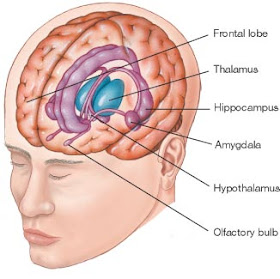The Brain:
Our brain is the most
complex organ and also the communication centre in our body. It communicates
with various body organs (through the nervous system) to keep them working effectively
together as an organized team to keep us healthy and happy. Our brain makes it
possible for us to think, feel hunger, feel physical pain and pleasure,
experience emotions, see with our eyes, hear with our ears, smell with our
nose, walk and work, sleep, respond effectively during danger, and maintain different
body function such as our heart beating, breathing etc.
Above all, our human
brain has various other unique abilities that distinguish us from other living
beings. On the other hand, it is these special abilities that bring both
prosperity and destruction on us and on other living beings. It is because of
human brain that we are able to think and reason out, analyses and be logical,
remember, be imaginative and creative, be wiser or unwise, and be human or
savage-like and so on.
So, our brain controls
and governs everything we do, how we think, feel and act. So, it is the control centre of our life that
determines what kinds of persons we are.
According to modern
science, our brain is divided into three main parts that are called the
cerebrum, the cerebellum and the brain stem. The cerebrum (or cerebral
hemispheres) makes up the largest part of our brain where learning, memory etc
take place. The brain stem, which controls our involuntary activity such as
breathing, is the lowest structure of the brain that is connected to our spinal
cord.
The cerebellum which
coordinates muscular activity such as walking, is the section located behind
the brain stem.
The thalamus,
hypothalamus and pituitary glands are situated in the central area of the brain.
The thalamus relays sensory information to the cerebrum. The hypothalamus helps
to regulate body functions such as thirst, hunger, sleep, anger, sexual behavior
etc. The pituitary gland produces hormones that help growth, development and
many other physiological functions. The pons medulla and midbrain are the
structures that make up the brain stem. The natural cavities inside the brain
that are filled with cerebrospinal fluid are called ventricles. The cerebrum of
the brain is divided into four lobes, and some of these lobes are separated by
deep grooves called fissures.
So, if our brain began
to weaken, it may affect the working of almost any organ of our body giving us
many health imbalances. Inability to move certain parts of the body, inability to
reason logically, poor memory, headache, hallucinations, falling asleep
suddenly are some health imbalances.


